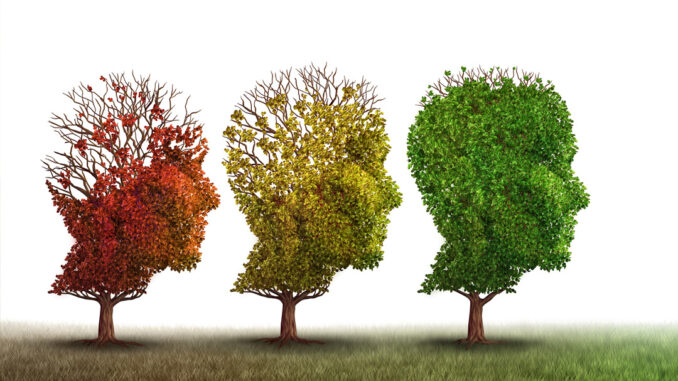
I recently attended an annual reunion dinner with some fellow senior physicians and sat beside a retired family doctor whom I had known for years. During our conversation, he disclosed that he had recently been diagnosed with early Alzheimer’s disease (AD) and that this would be his last reunion. Having treated patients during his career with the same condition, he was well aware of the progressive deterioration which he could expect and was quite depressed over his condition. I noticed hardly any change in him other than his repeating several things and forgetting the names of a few of our mutual friends.
During my medical training years ago, Alzheimer’s disease was included in the diagnosis of pre senile dementia which included a number of similar diseases resulting in gradual mental deterioration, often at that time leading to palliative care in a mental hospital. Since then, further delineation of specific diseases within that broad label has allowed physicians to make more specific diagnoses and initiate more appropriate treatment plans for AD and other causes of mental decline.
AD is a chronic neurodegenerative disease that damages brain tissue, resulting in deterioration in thinking skills and memory loss. As of January 1, 2025, The Alzheimer Society of Canada estimates that there are 771,939 people in Canada, living with dementia; it is estimated that 70% are age 75 and older. AD is the most common cause of dementia, but others include Frontotemporal Dementia (Pick’s Disease), Lewy Body Dementia, Vascular Dementia and Parkinson’s Disease, as well as others. This shows the necessity for careful medical evaluation and investigation to determine the correct cause of the dementia, as treatments may differ.
Early signs and symptoms of AD usually come on very gradually and may include a number of changes. Memory loss is common with aging, but the memory loss associated with AD is progressive and is often combined with repeated statements and questions, increasing over time. Patients can begin forgetting times, conversations, appointments or events. They may misplace things and reasoning and judgments may be difficult. As symptoms progress, individuals may experience mood and behavioural changes. There may be loss of interest in their favourite activities, social withdrawal and episodes of anger. If still driving, patients may become unfamiliar with roads and destinations.
At the early stages when symptoms first appear, it is important that a proper medical evaluation be completed to establish whether there is dementia and, if so, what is the precise diagnosis. Only then can the proper management protocol be initiated. Although at this time there is no cure for AD, confirming the diagnosis leads to specific management plans to enhance living conditions for both the patient and the family.
Patients showing signs of early dementia require a careful and complete medical assessment by a primary care physician. In addition to a detailed history, a thorough physical examination is necessary to determine any other abnormalities which may account for the symptoms. Discussion with a family member or close friend is important to get an objective view of the signs and symptoms which the patient is experiencing, such as impaired memory, changes in personality, periods of confusion and forgetfulness. Other health conditions such as Parkinson’s disease, depression, strokes, sleep apnea and mild memory loss common with normal aging will be ruled out. The doctor or assistant might administer one of several cognitive tests available which assist in confirming the presence of dementia. If there is still doubt, neuropsychological tests can be administered by a trained specialist to further determine the extent of dementia.
Most cases of AD can be confirmed with the evaluation described but, in some cases, the physician will order a brain scan to assist in diagnosing AD as well as to rule out other causes such as stroke, brain hemorrhage and brain tumour. The scan may be an MRI, a CAT scan or a PET scan. Such tests are not conclusive as age-related changes in scans can show similar findings, but can add to the other information to support the diagnosis of AD.
Diagnosing the condition at an early stage is helpful not only in ruling out other causes, but also in planning for ongoing care and prescribing medications that may slow the progression of memory loss and decline in cognitive skills. Over-the-counter medications purporting to reverse memory loss and other symptoms should be avoided. Caregivers with expertise in AD can assist with finding access to community resources, arranging activities and relieving spouses and family members who provide constant care. Community resources may include legal and financial planning assistance as well as home care services, including nursing care. If institutional care is eventually needed, most communities have appropriate secure facilities to accommodate persons with advanced dementia.
There are several organizations – both provincial and national – that provide vital information to families about AD. In Canada, the Alzheimer Society of Canada (alzheimer.ca) is a leading source for information on dementia. Their mission is “to alleviate the personal and social consequences of Alzheimer’s disease and other dementias and to promote the search for causes, treatments and a cure.” In addition, there are independent provincial societies representing each province including The Northwest Territories, as well as many local societies in most larger communities, all readily accessible on the internet.
Most of us know or have known someone with AD and understand the unfortunate toll which the disease takes on both the patient and family members. At this time there is no cure, but significant advances in diagnostic tools have been made and treatments to delay progression of the disease, as well as potential cures, are being actively pursued. Support for research is very much needed and is actively supported through donations to these societies.
